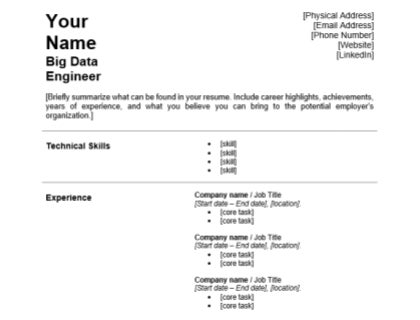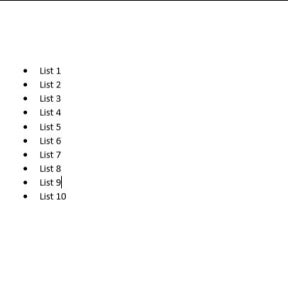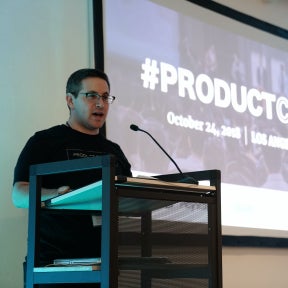
Big Data Engineer Resume - Free Template
Download this big data engineer resume template in Microsoft Word format and make it your own.
Download NowBig Data Engineer Resume Example:
Your Name
Big Data Engineer
[Physical Address]
[Email Address]
[Phone Number]
[Website]
[LinkedIn]
[Briefly summarize what can be found in your resume. Include career highlights, achievements, years of experience, and what you believe you can bring to the potential employer's organization.]
Technical Skills:
• [skill]
• [skill]
• [skill]
• [skill]
Experience:
Company name / Job Title
[Start date – End date], [location].
• [core task]
• [core task]
• [core task]
Company name / Job Title
[Start date – End date], [location].
• [core task]
• [core task]
• [core task]
Company name / Job Title
[Start date – End date], [location].
• [core task]
• [core task]
• [core task]
Education:
School name / Degree
[Start date – End date], [location].
School name / Degree
[Start date – End date], [location].
School name / Degree
[Start date – End date], [location].
Certification:
• [certificate]
• [certificate]
• [certificate]
Notable Achievements:
• [achievement]
• [achievement]
• [achievement]
How to Write a Big Data Engineer Resume:
A step-by-step guide to writing the perfect big data engineer resume.
Add your contact details.
Start with your personal information.

Provide your name, physical address, email address, and mobile contact number.
Consider adding links to your own website or linkedIn Page

If you have a professional website or LinkedIn page, add the links with your contact information.
List your skills.
List your technical skills first.

Add a list of skills and competencies you have acquired over time. These should be the basic ones required to fulfill the role you are after, but also others that are relevant and may set you apart from other candidates.
List skills that are specifically mentioned in the job description.

Employers often list specific coding and software skills in the job description. If you have the required skills, be sure to mention them. For a big data engineer role, your skillset should include Apache Hadoop, NoSQL databases, cloud clusters setup, Apache Spark, etc.
Add your employment history.
List your experience in reverse chronological order.

Start with your most recent or current position and work down. Each item in your list should include the name of the company, your position in it, how long your employment lasted, and where the company is located. Then, using bullet format, list your core tasks and responsibilities.
Use bullet points to highlight your responsibilities.

When listing your work experience use bullet points to highlight your core tasks and responsibilities in each role. This will make it easier to read for someone skimming through your resume.
List your qualifications.
Start with your education.

In this section list what degrees, diplomas, or certificates you have and where you studied, starting with your highest degree. Include relevant dates.
List any certifications.

If you have any relevant certifications such as the Big Data Hadoop Certification or Microsoft's MCSE Data Management and Analytics Certification, list them here.
Add relevant achievements.
Start with major work accomplishments.

List your proudest accomplishments throughout your career. These can include designing and building data processing pipelines using the Hadoop ecosystem to increase revenue, collaborating with multiple development teams to research, build, and maintain data lakes for storing and analyzing information, building a cloud-based platform that makes developing new applications easy, etc.
List your awards.

If you received any awards for your contributions at work, this is a good place to list them.
What Employers Look for in a Big Data Engineer Resume:
- A Bachelor’s degree in computer engineering or computer science.
- Experience as a big data engineer.
- In-depth knowledge of Hadoop, Spark, and similar frameworks.
- Proficiency in Java, C++, Linux, Ruby, PHP, Python, and R.
- Knowledge of NoSQL and RDBMS databases including Redis and MongoDB.
- Some experience with Mesos, AWS, and Docker tools.
- Exceptional project management and communication skills.
- Proven ability to solve complex networking, data, and software problems.

